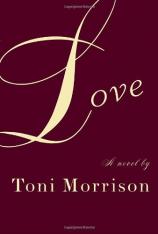Reading Group Guide
Discussion Questions
Love

1. Why has Toni Morrison chosen Love as the title for her novel? In what ways is the book about Love? What kinds of Love affect and afflict its characters? What does the novel, taken as a whole, suggest about the nature of Love?
2. The main narrative of Love is framed by, and interspersed with, L's italicized reflections. Why does Morrison use this framing device? How does it affect the way the book is read? Is L's interpretation of events the most reliable one? From what vantage does she speak?
3. L claims she needs "something better" than an "old folks' tale to draw on... Like a story that shows how brazen women can take a good man down." (p. 10) Is that what Love is mainly about? Is Cosey brought down by brazen women? Why would L think so?
4. Throughout the novel Romen struggles to find his real self. When he refuses to join his friends in gang-raping a woman at a party, he does not understand at first why his heart bursts for "a wounded creature" and wonders, "What made him do it? Or rather, who?
"But he knew who it was. It was the real Romen who had sabotaged the newly chiseled, dangerous one." (p. 49) Where else in the novel is Romen torn between lust and compassion? Which finally wins out in him?
5. L says that Mr. Cosey, in the way he ran his hotel, "wanted a playground for folk who felt the way he did, who studied ways to contradict history." (p. 103) How does Mr. Cosey "contradict history"? What history, specifically, does he contradict? What makes his hotel so attractive to blacks in the 1930s, '40s, and '50s? Why does his hotel ultimately fail?
6. Junior tells Heed that she'd sooner "swallow lye before I'd live with my folks." Heed recognizes the feeling: "We're both out here, alone. With fire ants for family." (p. 127) Why is family, in the novel, so often a source of misery?
7. When the administrator at the juvenile correctional institute pressures Junior for a sexual favor, she pushes him off the balcony. What are the short -- and long-term consequences of this act for Junior? Why is she treated like a criminal for protecting herself?
8. How does the burgeoning civil rights movement affect the characters in the novel? What role does it play in May's madness and in the decline of Mr. Cosey's hotel?
9. Sandler thinks to himself that everyone forgave Cosey everything: "Even to the point of blaming a child for a grown man's interest in her. What was she supposed to do? Run away? Where? Was there someplace Cosey or Wilbur Johnson couldn't reach?" (p. 147) In what ways are Heed and the other women in the novel trapped not only by racism but by the power men wield over them? Which seems to be the more oppressive force?
10. What destroys the friendship between Heed and Christine and turns them into the bitterest of enemies? What enables them to be reconciled to each other at the end of the novel?
11. Why is Mr. Cosey so drawn to Celestial, the prostitute? Why would he want to leave everything to her?
12. In the novel's climactic scene, Christine tells Heed, " . . . [I]t's like we started out being sold, got free of it, then sold ourselves to the highest bidder." To which Heed responds, "Who you mean 'we'? Black people? Women? You mean me and you?" (p. 185) Who does she mean? Is it true that Blacks, or women, or Christine and Heed themselves, have been sold, gotten free, and resold themselves?
13. Near the end of the novel L says of Cosey: "You could call him a good bad man, or a bad good man. Depends on what you hold dear -- the what or the why. I tend to mix them." (p. 200) What kind of man is Cosey, finally? What are his good and bad traits? Has he brought more happiness or suffering into the world? How disturbing is it that he marries an eleven-year-old girl?
14. What does Love, as a whole, suggest about the relationships among history, family, race, and gender? How are the individuals in the novel affected by these larger forces? What does the novel reveal about the particular historical moment in which it is set?
Love
- Publication Date: October 28, 2003
- Genres: Fiction, Literary Fiction
- Hardcover: 208 pages
- Publisher: Knopf
- ISBN-10: 0375409440
- ISBN-13: 9780375409448









